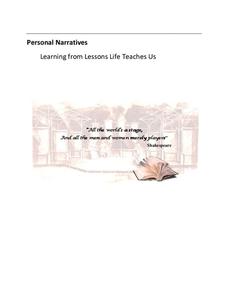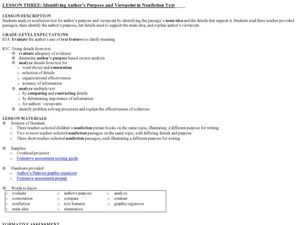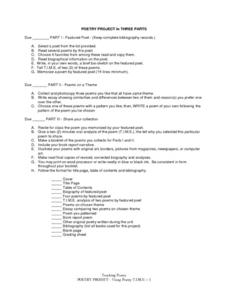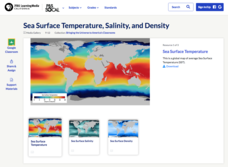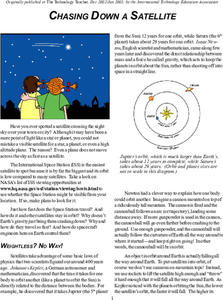ESL Kid Stuff
Subject Pronouns (I, You, He, She, We, They)
How are you feeling? Language learners practice using subject pronouns with adjectives by responding to questions, engaging in games, and singing songs.
Curated OER
Using Saber and Conocer
What is the difference between saber and conocer? Language learners sometimes have difficulty with these words because of their similar meaning. Clear up confusion with the information and presentation included here. The website and...
Handwriting Without Tears
Handwriting Without Tears
Does learning to write leave your kindergartners in tears? Use these easy and memorable strategies to guide their pencils in the right direction. With cute illustrations and simple instructions, your learners will be writing paragraphs...
EngageNY
Transformations—The Next Level
Transform your geometry instruction by incorporating role play into math class. Pupils begin by completing an assessment to locate unknown angles, and then performing a simulation activity to better understand rotations, reflections, and...
Curated OER
Earthquakes: Fourth Grade Lesson Plans and Activities
Examine earthquake intensities and ways to measure an earthquake through the comparison of the Mercalli and Richter scales. After completing the pre-lab worksheet, fourth graders compare high and low intensity quakes by testing the...
Pearson
Subject and Object Pronouns; Direct and Indirect Object
Replacing a gift can end up in an awkward moment—but not when replacing a noun with a pronoun! Watch the most effective ways to use subject and object pronouns, as well as direct and indirect object pronouns, with an entertaining grammar...
Thoughtful Education Press
Personal Narratives: Learning from Lessons Life Teaches Us
"First Appearance," Mark Twain's tale about overcoming stage fright, serves as a model of a personal narrative and gets young writers thinking about milestones in their own lives. After examining student models and considering the...
US Holocaust Museum
Defying Genocide
Defying death. Defying those who want to do harm. Defying genocide. Pupils research the events in Rwanda to gain an understanding of what it takes to survive a horrific event like a holocaust. They use video, time lines, and Holocaust...
College Board
Calculations Aren't Enough!
Unlike mathematics, statistics comes with a context. The author reminds teachers that data analysis involves using the context to make sense of the numbers. The article stresses good communication skills by highlighting the scoring...
American Museum of Natural History
A Whale of a Tale
What's the most interesting fact about a blue whale? Learners read an interview about the similarities between the Titanosaur and the blue whale displays at the American Museum of Natural History. Pupils learn not only about blue whales...
Curated OER
When the Fly Flew In by Lisa Westberg Peters
The students will listen to the story When the Fly Flew In, and be able to identify the main idea of the story and many of the (supporting) details. Students will also develop an appreciation for the humor and illustrations. After...
Curated OER
Poetry in Motion
Young scholars choose a poetry theme. They write a poem, illustrate it with digital images and record it using a digital video camera.
Curated OER
Identifying Author’s Purpose and Viewpoint in Nonfiction Text
Why do people write books? Pupils discover how to identify the author's viewpoint. They read non-fiction passages their instructor selects (the plan has the class look at nonfiction children's picture books), and then identify the...
Teaching English
Poetry Project in Three Parts
It’s poetry T.I.M.E! Individuals use the T.I.M.E. format (T = Title, thought, and theme; I = Imagery and figurative language; M = music and sound; E = emotion) to study a poet, collect poems that have a similar theme, and create a...
Curated OER
What You See Is What You Read
Using the popular text Franklin Goes to the Hospital, youngsters make predictions by looking at the cover of the book. They draw their predictions, listen to the story, and compare their predictions to what actually happened in the story.
Curated OER
Look for Patterns: Quilts in Two Faith Ringgold Stories
Author Faith Ringgold uses quilts to illustrate her books Tar Beach and Aunt Harriet's Underground Railroad. In this integrated trio of activities, young scholars read stories, identify and create patterns, and design quilt squares of...
PBS
Sea Surface Temperature, Salinity, and Density
Earth's vast ocean is full of mysteries! Science scholars discover the big-picture properties that influence its characteristics at different latitudes using a lesson from PBS's Weather and Climate series. After completing a background...
Curated OER
The Green Truck Garden Giveaway
Young scholars read "The Green Truck Garden Giveaway" and explore the hobby of gardening. After observing illustrations in the book, students predict possible events in the story. They discuss gardening and write a story about a...
Digital Public Library of America
Beloved by Toni Morrison
Any classroom study of Toni Morrison's Pulitzer Prize-winning novel Beloved requires careful planning and scaffolding. A primary source set that includes a video, illustrations, photos of artifacts, and a broadside of the Fugitive Slave...
NASA
Chasing Down a Satellite
Calculate the speed of the International Space Station. By reading the article, pupils learn about the concept of orbits. Scholars work through a formula to determine how fast the International Space Station is traveling to stay in...
Connecticut Energy Education
The Carbon Cycle Game
Have you ever wanted to be an atom of carbon? The lesson allows each student to be an atom of carbon in the carbon cycle. First, they follow through the cycle as it existed before human interference. Then, they try the same activity, but...
University of North Carolina
Literature Reviews
A literature review goes beyond simply giving a novel a thumbs up or thumbs down. In fact, it may not require an opinion at all. Using a handout on literature reviews, part of a larger series on specific writing assignments, writers...
Carl's Corner
Four Little Penguins
What happens to the four little penguins sitting on the ice? Find out with a mini book that includes eight pages of illustrations and rhyming lines. Sure to delight the penguin lovers in your class!
Concord Consortium
Chain Reaction Between Hydrogen and Oxygen
Looking for a simple way to teach conservation of energy in chemical reactions? Pupils can observe energy changes as water forms during a chain reaction between oxygen and hydrogen using an interactive. The resource instructs users to...








